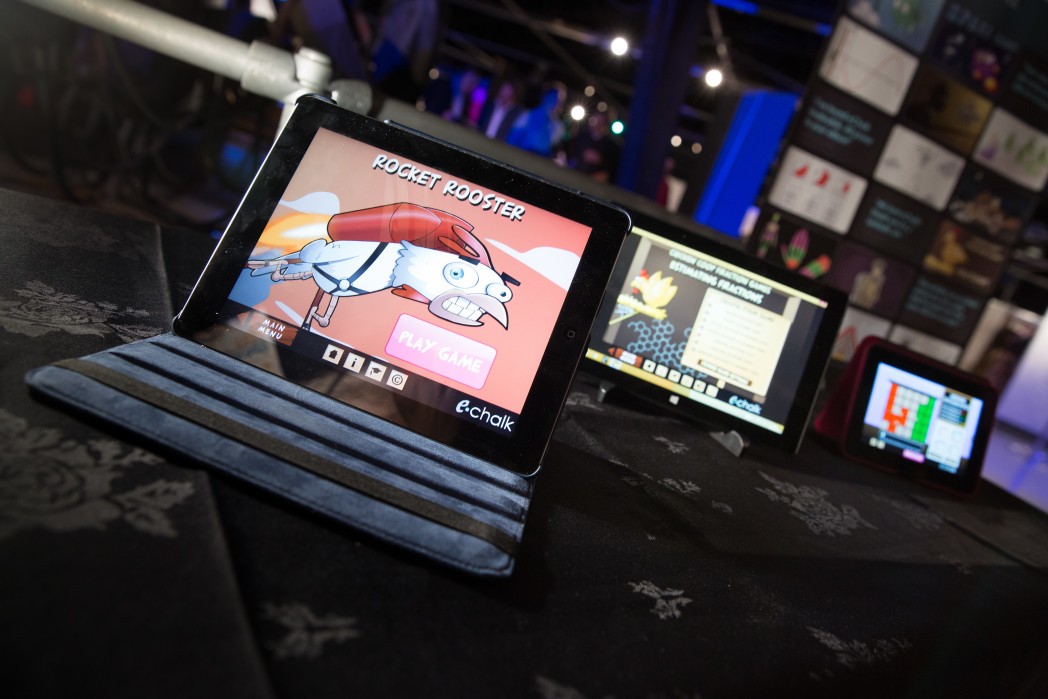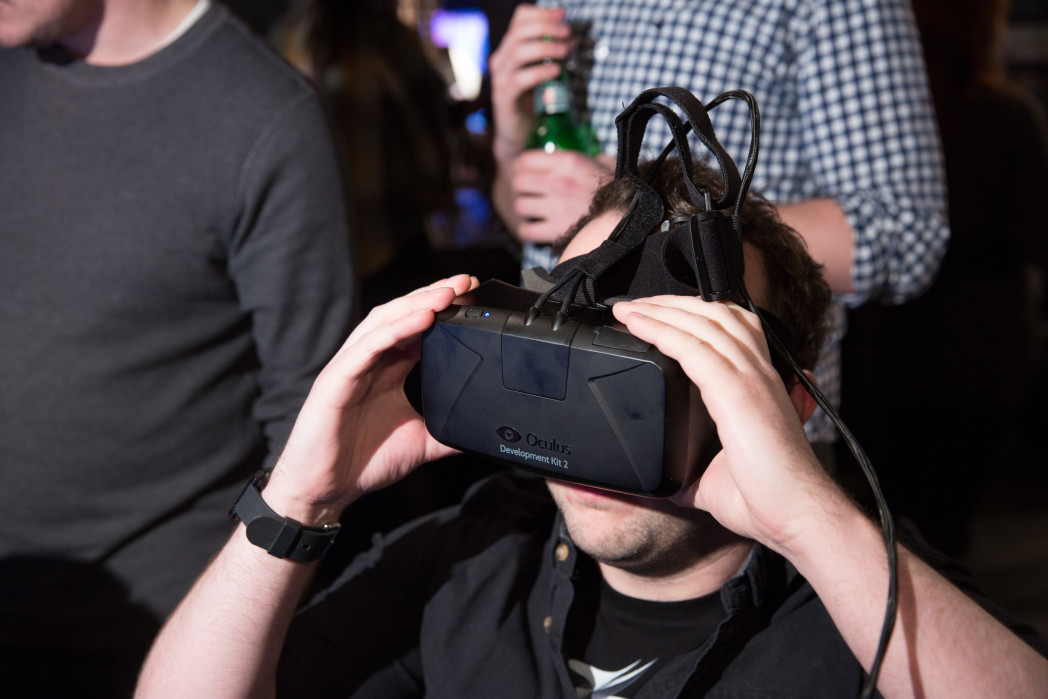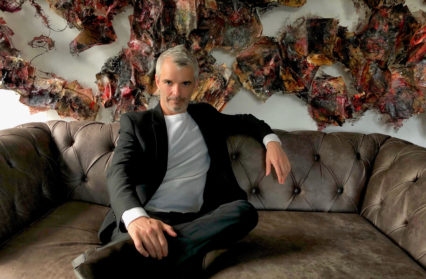Gabs Tanner was at the BAFTA Cymru Awards for Games and Interactive Experience nominees party, where she was able to sample some of the products up for awards on June 19th.
Nominees party for the BAFTA Cymru Awards for Games and Interactive Experience at The Doctor Who Experience
In order to get to the nominees party for the BAFTA Cymru Awards for Games and Interactive Experience, I had to walk through the doors of the TARDIS.
The Doctor Who Experience in Cardiff may sound like a strange choice of venue to celebrate the achievement of Welsh games. Initially the link appears to be a combination of Welsh pride mixed with nerd culture, but it’s much more about the appreciation of design and creativity. It felt natural for the nominated games and their developers to be surrounded by the intricately made artefacts and props, which was reflected in the light-hearted, enthusiastic atmosphere. Every movement was followed by the eyes of an assortment of creatures, at the centre of which was The Silence, whose large exhibition was surrounded by tables hosting each of the nominated games, available for play.
Feeling right at home amid the Doctor Who memorabilia was Richard Jenkins, producer of The Doctor and the Dalek (2014-2015). The game has been made by both BBC Cymru Wales Online & Learning and Somethin’Else, and is nominated for the BAFTA award for Games and Interactive Experience. Players take control of a Dalek and guide it through platforming stages, which are broken up by puzzles games with a coding theme. Richard explained that coding has recently been added to the KS2 and KS3 curriculum, but teachers found many children to be uninterested in the subject. What better way to sneakily get children learning than by incorporating it into a Doctor Who game? Richard added that the games programming sections had been designed to function in a similar way to the programs used by Key Stage students, such as Scratch, in order to increase understanding and usefulness. While some of the platforming levels were rather fiddly at times (Richard was apologising for the tricky sections with a cheeky grin, while looking over my shoulder), I really enjoyed the puzzle coding sections which slowly increased in difficulty at a good pace.
Also nominated for the BAFTA award for Games and Interactive Experience is A Mechanical Story (2014) by Skyfish Studios LTD. The player is met with a mechanical contraption puzzle and must fill the gaps with the correctly sized cogs for everything to mesh together and finish the level. It starts simply, with a clear introduction, but becomes increasingly difficult through the 48 levels. Co-Founder and Developer of the game, Yucel Karamanli, expressed great pride over the cutesy art style, which has broadened the demographic of the game. I could not help but feel that if this art style had been more prevalent in the level design, the game might have been even more appealing. The levels in the game quickly start to look visually similar, which does not reflect the skill in the design of the puzzles themselves. Yucel spoke very humbly, for the sole developer of a three person team, mentioning that the lack of numbers limited what they were able to achieve. However, with the game taking a year to make, the company should be very proud of their creation and I look forward to the future projects that are already in the works.
 A game I had a lot of interest in was Madron (2014), an episodic game in the style of an interactive comic book, told completely in Welsh. Before the party, I had managed to watch the cinematic cut-scene that takes place in the first episode, and easily got a grasp of what was going on, despite the language barrier. I was therefore rather excited for the opportunity to play a sneak peek of the English version that was available at the event. The plot follows Seren Sawyer who finds herself caught in the middle of a Zombie apocalypse after a rocket explosion causes a virus to release into the air. With the help of her friend Ishmael, the two must save the world while discovering the secrets behind what happened. Madron’s producer chatted with me about how the idea had grown through wanting to create a game in a comic book style. During research, the team discovered that other similar apps simply required people to flick through the pages of the story. Madron’s team instead wanted to combine animation, cut scenes and games to create a more interactive and engaging story. I was really struck by the manga art style that captured the atmosphere and creepiness of the zombies, while still managing to be child friendly. Made by Cube, Glasshead and S4C, the game is nominated for three awards; Artistic Achievement Commendation, Sound & Music Commendation and Technical Achievement Commendation.
A game I had a lot of interest in was Madron (2014), an episodic game in the style of an interactive comic book, told completely in Welsh. Before the party, I had managed to watch the cinematic cut-scene that takes place in the first episode, and easily got a grasp of what was going on, despite the language barrier. I was therefore rather excited for the opportunity to play a sneak peek of the English version that was available at the event. The plot follows Seren Sawyer who finds herself caught in the middle of a Zombie apocalypse after a rocket explosion causes a virus to release into the air. With the help of her friend Ishmael, the two must save the world while discovering the secrets behind what happened. Madron’s producer chatted with me about how the idea had grown through wanting to create a game in a comic book style. During research, the team discovered that other similar apps simply required people to flick through the pages of the story. Madron’s team instead wanted to combine animation, cut scenes and games to create a more interactive and engaging story. I was really struck by the manga art style that captured the atmosphere and creepiness of the zombies, while still managing to be child friendly. Made by Cube, Glasshead and S4C, the game is nominated for three awards; Artistic Achievement Commendation, Sound & Music Commendation and Technical Achievement Commendation.
Just to the left of Madron’s table was eChalk Ltd, with their educational app entitled Chicken Coop Fractions (2014), nominated for the Gameplay Design Commendation. The game’s designer explained that many educational games focus more on entertainment, rather than the learning. eChalk aims to create an interactive game that could help children learn both in and out of the classroom. The app is divided into 5 mini-games that all work towards teaching fractions to children. The games utilise a fun chicken-themed cartoon style, for example in Rocket Rooster: Adding Fractions players must work out the correct combination of rockets that match a fraction, to fire a chicken through the air and into his nest. Each game has three difficulty settings and a multitude of different stages, to target a diverse range of ages and skill levels. I was a little ashamed at my poor maths skills while playing the game, but found myself having fun and quickly improving as old skills kicked in.
The evening was split up by a short ceremony where each company was awarded nominee certificates. It was to everyone’s amusement that those from Thud Media were going in circles between the awards podium and photos, as three of their games have been nominated for awards. Boj Digs (2014) is up for the Artistic Achievement Commendation, Gameplay Design Commendation and Sound & Music Commendation. Toot’s Harbour (2015) made with Cloth Cat Animation, is nominated for Artistic Achievement Commendation and Sound & Music Commendation. Finally, Pyramid (2014), made in collaboration with Boom Kids, is also up for the Gameplay Design Commendation. All three games make use of existing IP, with Boj Digs and Toot’s Harbour both coming from CBeebies programs and Pyramid with a children’s quiz show on S4C. Boj Digs gives a simple picture story where Boj must go underground and collect the items that other characters need. Players move Boj with their finger on the screen in order to steer him towards the items. The controls are smooth, the visuals colourful and the music is cheerful. The game encourages exploration as missing items has no negative consequences. Toot’s Harbour includes a series of mini games based off the franchise, including I Spy, where players must search for characters from the show by scrolling across the environment on the screen. The app is colourful and has a great level of simplicity which is perfect for the target age group. However, I found some of the pictures of characters in I Spy were at different angles to the characters in the scene, which could cause confusion. Thud Media were approached by S4C to make the games for their show Pyramid. The app, Pyramid (2014), is to be played in conjunction with the show, so players can test their skills while those on the programme compete against each other. While the games are successful within the show format, the lack of a virtual host or any real competition within the app itself means it lacks much depth on its own and therefore does not succeed well as a standalone experience.
 The game that got most people’s attention was Infinity Runner by Wales Interactive, nominated for the BAFTA award for Games and Interactive Experience. The game is available to play across multiple platforms and the company was showing off its Oculus Rift support. The Oculus Rift is a relatively new piece of technology that comes in the form of a headset, giving the player the impression that they are inside the game, as screens in front of each eye blur together to create the illusion of depth. Infinity Runner is a constant runner game in a first person view with a science fiction setting, which requires players to jump, slide, and attack enemies via quick time events. The game is fast paced and requires quick reactions, making the Oculus Rift version thrilling but slightly disorientating.
The game that got most people’s attention was Infinity Runner by Wales Interactive, nominated for the BAFTA award for Games and Interactive Experience. The game is available to play across multiple platforms and the company was showing off its Oculus Rift support. The Oculus Rift is a relatively new piece of technology that comes in the form of a headset, giving the player the impression that they are inside the game, as screens in front of each eye blur together to create the illusion of depth. Infinity Runner is a constant runner game in a first person view with a science fiction setting, which requires players to jump, slide, and attack enemies via quick time events. The game is fast paced and requires quick reactions, making the Oculus Rift version thrilling but slightly disorientating.
The final nominated game, also using Oculus Rift, was Neilson 360 VR Project, a windsurfing experience created by Atticus Digital and nominated for Technical Achievement. The game was commissioned by London agency MBA to create a ‘Have a go, before you go’ experience for customers that want to try windsurfing at Neilson Active Holidays. The use of Oculus Rift technology allows the player to have a realistic experience of the sport right before their eyes. The company was not in attendance so, unfortunately, I was unable to sample their game.
It is clear the Wales has a lot to offer, and the event displayed a large variety of styles and gameplay within only a small number of companies. The BAFTA Cymru results will be announced as part of the Wales Games Development Show on the 19th June, which is open to members of the public. The party was an exciting prequel to the Show, which will host over 40 different exhibitors offering playable demos of their latest games, while encouraging face-to-face conversation and feedback. Wales should be excited about the games that it’s producing and the nominees party was an interesting insight to the Welsh Gaming industry.












